Saturday 19 April 1941
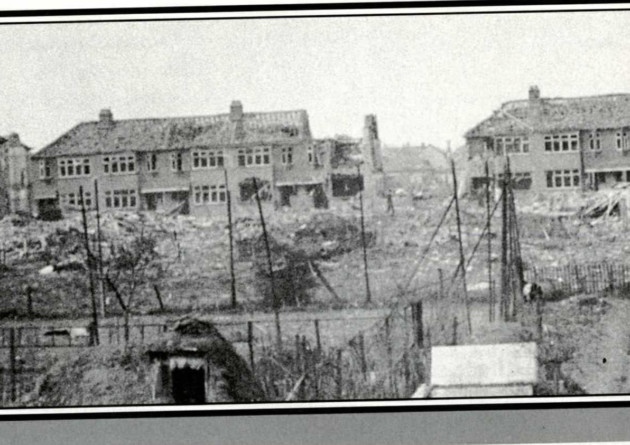 |
| Devastation at Essex Road, Romford (Picture: "Hitler v Havering" by Peter Watt via Romford Recorder) |
Operation Marita: With Yugoslavia out of the war now and the British settling into a new line running from Thermopylae to Corinth on 19 April 1941, the focus turns to the Greek Epirus Army in Albania. It has pulled out of some positions in Albania, which the Italians there somewhat tentatively have occupied, but the bulk of the Greek Epirus Army remains in the mountains along the Greece/Albania border.
The 1st SS Panzer Division Leibstandarte SS Adolf Hitler ("LSSAH," still brigade-size at this point in the war) under SS-Obergruppenführer Sepp Dietrich (Hitlers former chauffeur) once again makes a radical change in its orientation to address this situation. Having moved west into Yugoslavia and then south into Greece, the LSSAH now heads west again into the mountains to confront the Greeks. The Greeks are trying to escape through the Metsovon Pass in the Pindus Mountains, which is at an altitude of 5000 feet, so the LSSAH has a bit of a climb on its hands.
However, the Germans don't even have to do fight the Greeks to defeat them - all they need to do is seize Ioannina, which controls the Greek's supply road. The LSSAH closes up on Ioannina today against light opposition, which is a mystery considering the city's strategic importance. In fact, reports coming out of the mountains, such as by Greek Generals Ioannis Pitsikas and Georgios Bakos, indicate that Greek troop morale has collapsed and they may not have the motivation any longer to continue a hopeless cause.
Elsewhere, the day is spent by the British occupying their new defensive line and the Germans closing upon it. The Germans of the XVIII Mountain Corps take firm control of Larissa, which bottles up any remaining Allied troops in the northeast of Greece and makes their escape route dependent either upon air or naval transport. The Germans find that the British at the airfield left so precipitously that they abandoned sufficient rations and other supplies to supply the German unit's continued move south.
Winston Churchill once again demonstrates the borderline contempt that he feels toward Middle East Commander General Archibald Wavell. He sends him a querulous Secret memorandum that can best be characterized as snotty. It reads in part:
The Luftwaffe bombs and sinks 1822 ton Greek freighter Teti Nomikou at Chalkis.
Royal Navy submarine HMS Regent, based in Malta, arrives at Kotor, Yugoslavia to rescue the British Ambassador, Sir Ronald Campbell, and other VIPs. However, the Germans are in possession of the port and bomb the submarine as it approaches, injuring an officer, rake it with machine-gun fire from the shore. The Regent's commanding officer, Lt. Commander H.C. Brown, and a sailor are shot by the machine gun and seriously wounded. The Regent departs without the ambassador or an officer, Lieutenant D. Lambert, who is sent ashore to locate him.
The German 164th Infantry Division sends troops to occupy Samothrace.
Iraq: The British seized Basra on the 18th with the landing of the Indian 20th Infantry Brigade. Legally, this is proper according to a 1930 treaty. However, the Iraqis see their chance to break free of colonial British rule, don't care about treaties.
The Rashid Ali government, defiantly pro-Axis, steps up its movement of large military forces to the vicinity of RAF Habbaniya, one of two major British airbases in Iraq. This airbase, about 50 miles (80 km) west of Baghdad on the Euphrates, is isolated and vulnerable to many forms of pressure. The Iraqis move an infantry brigade, a separate artillery brigade, a few tanks, a dozen armored cars, and assorted other units to a plateau that overlooks the airbase. The Iraqis demand that all movement to and from the base cease, but the British fly in half a dozen additional Gloster Gladiator fighters to Habbaniyah.
The British strategic problem is that they have large forces in Iraq, but they are widely separated by increasingly hostile territory. The Germans, upon whom Ali has called for aid, have a much bigger strategic problem. They cannot send ships to Iraq, so any presence must be via the Luftwaffe. However, the British control all the Iraqi airfields and the Germans, even if they could find a place to land, would have no logistical support. Reichsmarschall Hermann Goering, however, has high hopes of intervening anyway.
European Air Operations: The Luftwaffe returns to London again after dark with another massive raid. It is even more destructive than the previous raid on 16-17 April. As in 1940, the bombers continue arriving until the first glimmers of dawn. Total sorties (some planes fly multiple missions) equal 712, dropping about 1180 tons of bombs. The Luftwaffe loses only two planes. Casualties are not broken down between the missions, and total casualties are roughly 2300 killed and 3000 seriously wounded. The misery of London dwellers grows, with about 150,000 homes hit between the two raids.
Many important landmarks and public buildings are hit. These include the Speaker's House at Westminster, the Law Courts, Selfridge's, Christie's Auction House, and even St. Paul's, which takes a hit to the north transept and shatters the remaining stained glass windows. Eight London hospitals and many churches - including Christopher Wren's Holborn - are obliterated. London firefighters lose 13 men, the most so far during the war.
The devastation, of course, is worse in some districts than in others. It becomes known locally as "Essex Road Night" because of the damage inflicted upon Romford and Hornchurch. There are 38 dead there alone, mainly women and children. A bomb scores a direct hit on an air-raid shelter at 144 Brentwood Road, killing nine members of one family (the Gills).
RAF Bomber Command continues its patrols of the North Sea and also sends 36 aircraft to bomb coastal targets.
Battle of the Atlantic: The British receive a report at 01:17 that Kriegsmarine has moved the battleship Bismarck around the tip of northern Denmark toward the Atlantic ("the Skaw"). In fact, the Bismarck remains in port, but this sort of false alarm preys on the nerves of the Admiralty. The Admiralty switches a lot of its capital ships around, such as sending battlecruiser HMS Hood to the Bay of Biscay to relieve battleship HMS King George V.
Free French submarine Minerve sights German tanker Tiger being led by auxiliary minesweeper M.1101 along the coast of Norway southwest of Stavanger. The Minerve sinks the minesweeper but misses the tanker.
The Luftwaffe attack on London damages some ships at the quays, including:
British 133-ton dredger Fravis hits a mine and sinks at Langstone Harbour in Hampshire.
Royal Navy submarine HMS Sunfish collides with 707-ton net layer HMS Minster. This sends the Sunfish to the repair yard for almost exactly five months.
To man the US coast guard cutters transferred to the Royal Navy, sloop HMS Aberdeen departs Gibraltar bound for Halifax carrying 26 officers and 31 enlisted men to bring them to the UK.
German raider Atlantis transfers the captured passengers from sunk liner Zamzam to supply ships Alsterufer and Dresden, which will take them to Occupied France. Captain Rugge of the Atlantis orders the captives treated well. The Atlantis takes on board three crated Arado Ar-196 seaplanes for reconnaissance.
Convoy SC 29 departs from Halifax bound for Liverpool.
U-372 (Kapitänleutnant Heinz-Joachim Neumann) is commissioned.
Battle of the Mediterranean: The front around Tobruk is settling down. Both sides are launching occasional patrol, but there is no chance of a breakthrough at this time by either side. Lieutenant General Erwin Rommel busies himself with organizational changes such as switching his German and Italian units so that they had the appropriate duties (for instance, he orders that only German troops should occupy Bardia, which has been subject to aggressive British sea bombardments). He also greets the new commander of the 15th Panzer Division, Colonel Freiherr von Esebeck.
While inspecting the troops in the Sollum sector, Rommel observes that the British do not appear to have many troops in this key area. He resolves to continue his offensive into Egypt at this point rather than wait for the conquest of Tobruk. Most German commanders stay in their offices, but making the effort to visit the troops at the front often pays off for Rommel like this.
The British have mounted a series of commando raids of varying success. After dark, they try again. The British use 9919-ton freighter HMS Glengyle to deposit 450 commandos who are part of Layforce (2000 British commandos on call in the Middle East) at Bardia. The problems start even before the men get ashore, as there are difficulties with the landing craft. Then, there is supposed to be a shore party to guide them in, but it is delayed and not there. This probably contributes to the commandos landing on the wrong beaches. They can still complete their mission, but when they get to Bardia, they find it vacant. Searching for something to do, the commandos destroy an Italian supply dump and coastal artillery battery before returning to the beach for pick-up. The raid, though, comes to an unhappy ending for the British when 70 men go to the wrong evacuation beach and are captured, and when a British sentry mistakenly shoots one of his own officers.
The British government put the best face on this fiasco by claiming that it later induces the Germans to over-garrison Sollum - but Rommel was sending German troops there to garrison it anyway. Layforce essentially is disbanded after this and its men used as infantry on various special projects. One of the reasons that the Bardia Raid, as it is called, is remembered at all is that author Evelyn Waugh participates. He records in his diary (as opposed to the triumphant media accounts that soon follow) that the entire affair is an incompetent debacle against no opposition.
The Luftwaffe is getting more aggressive as it receives more units. Today is the first aerial combat over Tobruk involving the Luftwaffe. Fighter unit I,/JG 27, which has arrived after a short detour in the Balkans, make its first patrol and has an immediate impact. It shoots down four Hurricanes of RAF Nos. 73 and 274 Squadrons based at Gerawla which intercept a Junkers Ju 87 Stuka mission against the port. The Germans accomplish this at a cost of one of their own number (force-landed).
Two of the claims go to Oblt. Karl-Heinz Redlich, giving him ten victories. This is Obfw. Hans-Joachim Marseille's unit and he has seven victories at this time. The Luftwaffe has a number of advantages at this time in North Africa:
The Luftwaffe bombs and sinks 3257-ton Panamanian freighter Margit at Kalkara Creek, Malta.
The Italian 7th Cruiser Division lays a minefield with 321 mines and 492 explosive floats east of Cape Bon, Tunisia. The field will have a total of 740 mines when it is completed. This operation may be in response to the recent Royal Navy patrol near there that destroyed an Axis supply convoy to Tripoli.
The Luftwaffe bombs Malta, but the bombs fall in open fields and cause no damage.
Convoy ME 7 departs from Malta for Alexandria.
Anglo/Australian Relations: While Australia and England both belong to the Commonwealth and are thus more than just allies, some tension does exist between the two nations. One of those is the question of Australia's military participation in the European conflict. Visiting Australian Prime Minister Robert Menzies has a meeting with CIGS John Dill in which he exerts pressure to get Australians more commands when their troops are heavily engaged in the fighting. Specifically, Menzies thinks that General Wavell at least should have a senior Australian officer on his staff. Dill is "agreeable," according to Menzies, who is worried about a peace faction in Australia that he characterizes in his diary as "a minority, but noisy, and with access to the press."
German/Bulgarian Relations: Hitler meets with King Boris III of Bulgaria.
German/Hungarian Relations: Hitler meets with the Hungarian ambassador.
Switzerland: Bertolt Brecht's play "Mother Courage and Her Children" has its world premiere at the Schauspielhaus Zürich in Switzerland.
China: The Japanese launch the Fuzhou Operation. This targets an important administrative center that also has a handy airfield. In addition, the Japanese launch the Zhedong Operation, which is in the eastern part of Zhejiang Province.
British Homefront: Today is the compulsory registration date for women aged 20-12. Minister of Labour Ernest Bevin has exempted certain categories of women, such as those with young children, but even they must register to indicate their status. Only the smallest of children will get a mother out of the queues because the government is providing subsidized childcare. The government also is compelling companies to hire women via an Essential Work Order.
American Homefront: Les Pawson wins the Boston Marathon. He becomes the second man to win the race three times.
Weightlifter Steve Stanko lifts 1000 pounds total at the Mid-Atlantic Championships in York, Pennsylvania. This sets a new world record.
April 1941
April 1, 1941: Rommel Takes Brega
April 2, 1941:Rommel Takes Agedabia
April 3, 1941: Convoy SC-26 Destruction
April 4, 1941: Rommel Takes Benghazi
April 5, 1941: Rommel Rolling
April 6, 1941: Operation Marita
April 7, 1941: Rommel Takes Derna
April 8, 1941: Yugoslavia Crumbling
April 9, 1941: Thessaloniki Falls
April 10, 1941: USS Niblack Attacks
April 11, 1941: Good Friday Raid
April 12, 1941: Belgrade and Bardia Fall
April 13, 1941: Soviet-Japanese Pact
April 14, 1941: King Peter Leaves
April 15, 1941: Flying Tigers
April 16, 1941: Battle of Platamon
April 17, 1941: Yugoslavia Gone
April 18, 1941: Me 262 First Flight
April 19, 1941: London Smashed
April 20, 1941: Hitler's Best Birthday
April 21, 1941: Greek Army Surrenders
April 22, 1941: Pancevo Massacre
April 23, 1941: CAM Ships
April 24, 1941: Battle of Thermopylae
April 25, 1941: Operation Demon
April 26, 1941: Operation Hannibal
April 27, 1941: Athens Falls
April 28, 1941: Hitler Firm about Barbarossa
April 29, 1941: Mainland Greece Falls
April 30, 1941: Rommel Attacks
2020
The 1st SS Panzer Division Leibstandarte SS Adolf Hitler ("LSSAH," still brigade-size at this point in the war) under SS-Obergruppenführer Sepp Dietrich (Hitlers former chauffeur) once again makes a radical change in its orientation to address this situation. Having moved west into Yugoslavia and then south into Greece, the LSSAH now heads west again into the mountains to confront the Greeks. The Greeks are trying to escape through the Metsovon Pass in the Pindus Mountains, which is at an altitude of 5000 feet, so the LSSAH has a bit of a climb on its hands.
However, the Germans don't even have to do fight the Greeks to defeat them - all they need to do is seize Ioannina, which controls the Greek's supply road. The LSSAH closes up on Ioannina today against light opposition, which is a mystery considering the city's strategic importance. In fact, reports coming out of the mountains, such as by Greek Generals Ioannis Pitsikas and Georgios Bakos, indicate that Greek troop morale has collapsed and they may not have the motivation any longer to continue a hopeless cause.
Elsewhere, the day is spent by the British occupying their new defensive line and the Germans closing upon it. The Germans of the XVIII Mountain Corps take firm control of Larissa, which bottles up any remaining Allied troops in the northeast of Greece and makes their escape route dependent either upon air or naval transport. The Germans find that the British at the airfield left so precipitously that they abandoned sufficient rations and other supplies to supply the German unit's continued move south.
Winston Churchill once again demonstrates the borderline contempt that he feels toward Middle East Commander General Archibald Wavell. He sends him a querulous Secret memorandum that can best be characterized as snotty. It reads in part:
So far His Majesty's Government have not received from General Wilson or from you any account of the fighting in Greece, although heavy and prolonged actions have been in progress for several days, and lengthy newspaper reports of a confused character have been telegraphed home. This is not the way His Majesty's Government should be treated. It is also detrimental to the Service.... I wish you to make ... a short daily report of what is happening on the Front ... at least every twenty-four hours.A clearer slap in Wavell's face is hard to imagine. This is akin to a teacher remonstrating with a student to turn in his homework on time. Wavell's main problem, though, is not Churchill, but that he probably doesn't really have a true picture of the course of the conflict, because it is moving at a rapid pace and his local commanders probably don't have time to submit precise reports of their own locations when they are rolling down the highway toward the next defensive line.
The Luftwaffe bombs and sinks 1822 ton Greek freighter Teti Nomikou at Chalkis.
Royal Navy submarine HMS Regent, based in Malta, arrives at Kotor, Yugoslavia to rescue the British Ambassador, Sir Ronald Campbell, and other VIPs. However, the Germans are in possession of the port and bomb the submarine as it approaches, injuring an officer, rake it with machine-gun fire from the shore. The Regent's commanding officer, Lt. Commander H.C. Brown, and a sailor are shot by the machine gun and seriously wounded. The Regent departs without the ambassador or an officer, Lieutenant D. Lambert, who is sent ashore to locate him.
The German 164th Infantry Division sends troops to occupy Samothrace.
Iraq: The British seized Basra on the 18th with the landing of the Indian 20th Infantry Brigade. Legally, this is proper according to a 1930 treaty. However, the Iraqis see their chance to break free of colonial British rule, don't care about treaties.
The Rashid Ali government, defiantly pro-Axis, steps up its movement of large military forces to the vicinity of RAF Habbaniya, one of two major British airbases in Iraq. This airbase, about 50 miles (80 km) west of Baghdad on the Euphrates, is isolated and vulnerable to many forms of pressure. The Iraqis move an infantry brigade, a separate artillery brigade, a few tanks, a dozen armored cars, and assorted other units to a plateau that overlooks the airbase. The Iraqis demand that all movement to and from the base cease, but the British fly in half a dozen additional Gloster Gladiator fighters to Habbaniyah.
The British strategic problem is that they have large forces in Iraq, but they are widely separated by increasingly hostile territory. The Germans, upon whom Ali has called for aid, have a much bigger strategic problem. They cannot send ships to Iraq, so any presence must be via the Luftwaffe. However, the British control all the Iraqi airfields and the Germans, even if they could find a place to land, would have no logistical support. Reichsmarschall Hermann Goering, however, has high hopes of intervening anyway.
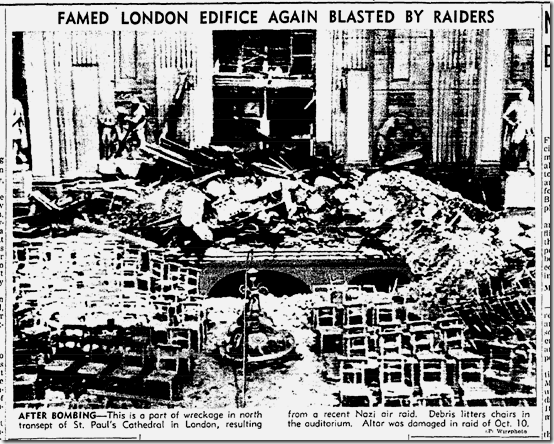 |
| Blitz damage to St. Paul's in London. LA Times, 19 April 1941. |
Many important landmarks and public buildings are hit. These include the Speaker's House at Westminster, the Law Courts, Selfridge's, Christie's Auction House, and even St. Paul's, which takes a hit to the north transept and shatters the remaining stained glass windows. Eight London hospitals and many churches - including Christopher Wren's Holborn - are obliterated. London firefighters lose 13 men, the most so far during the war.
The devastation, of course, is worse in some districts than in others. It becomes known locally as "Essex Road Night" because of the damage inflicted upon Romford and Hornchurch. There are 38 dead there alone, mainly women and children. A bomb scores a direct hit on an air-raid shelter at 144 Brentwood Road, killing nine members of one family (the Gills).
RAF Bomber Command continues its patrols of the North Sea and also sends 36 aircraft to bomb coastal targets.
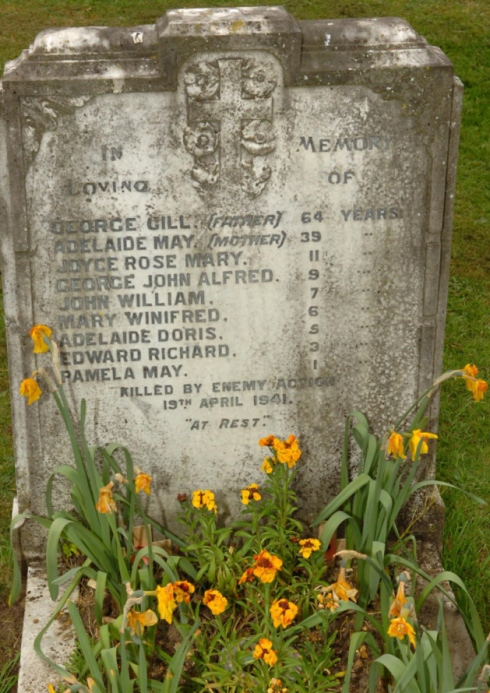 |
| The Gill Family at rest. You can win a war, but that won't bring back the fallen (Romford Recorder). |
Free French submarine Minerve sights German tanker Tiger being led by auxiliary minesweeper M.1101 along the coast of Norway southwest of Stavanger. The Minerve sinks the minesweeper but misses the tanker.
The Luftwaffe attack on London damages some ships at the quays, including:
- Destroyer HMS Wild Swan, in drydock
- Destroyer HMS Winchester, in drydock
British 133-ton dredger Fravis hits a mine and sinks at Langstone Harbour in Hampshire.
Royal Navy submarine HMS Sunfish collides with 707-ton net layer HMS Minster. This sends the Sunfish to the repair yard for almost exactly five months.
To man the US coast guard cutters transferred to the Royal Navy, sloop HMS Aberdeen departs Gibraltar bound for Halifax carrying 26 officers and 31 enlisted men to bring them to the UK.
German raider Atlantis transfers the captured passengers from sunk liner Zamzam to supply ships Alsterufer and Dresden, which will take them to Occupied France. Captain Rugge of the Atlantis orders the captives treated well. The Atlantis takes on board three crated Arado Ar-196 seaplanes for reconnaissance.
Convoy SC 29 departs from Halifax bound for Liverpool.
U-372 (Kapitänleutnant Heinz-Joachim Neumann) is commissioned.
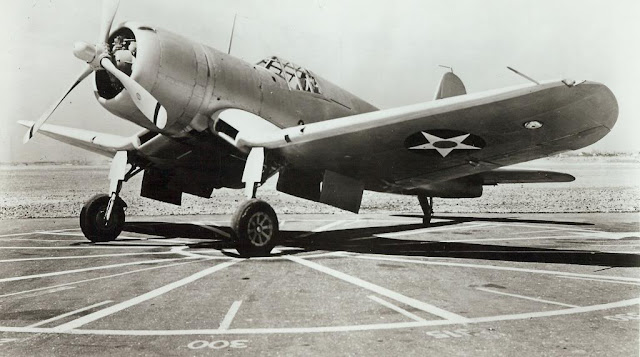 |
| Navy Vought XF4U-1 Corsair parked on a Compass Rose, Bridgeport Airport, on April 19, 1941. |
While inspecting the troops in the Sollum sector, Rommel observes that the British do not appear to have many troops in this key area. He resolves to continue his offensive into Egypt at this point rather than wait for the conquest of Tobruk. Most German commanders stay in their offices, but making the effort to visit the troops at the front often pays off for Rommel like this.
The British have mounted a series of commando raids of varying success. After dark, they try again. The British use 9919-ton freighter HMS Glengyle to deposit 450 commandos who are part of Layforce (2000 British commandos on call in the Middle East) at Bardia. The problems start even before the men get ashore, as there are difficulties with the landing craft. Then, there is supposed to be a shore party to guide them in, but it is delayed and not there. This probably contributes to the commandos landing on the wrong beaches. They can still complete their mission, but when they get to Bardia, they find it vacant. Searching for something to do, the commandos destroy an Italian supply dump and coastal artillery battery before returning to the beach for pick-up. The raid, though, comes to an unhappy ending for the British when 70 men go to the wrong evacuation beach and are captured, and when a British sentry mistakenly shoots one of his own officers.
The British government put the best face on this fiasco by claiming that it later induces the Germans to over-garrison Sollum - but Rommel was sending German troops there to garrison it anyway. Layforce essentially is disbanded after this and its men used as infantry on various special projects. One of the reasons that the Bardia Raid, as it is called, is remembered at all is that author Evelyn Waugh participates. He records in his diary (as opposed to the triumphant media accounts that soon follow) that the entire affair is an incompetent debacle against no opposition.
The Luftwaffe is getting more aggressive as it receives more units. Today is the first aerial combat over Tobruk involving the Luftwaffe. Fighter unit I,/JG 27, which has arrived after a short detour in the Balkans, make its first patrol and has an immediate impact. It shoots down four Hurricanes of RAF Nos. 73 and 274 Squadrons based at Gerawla which intercept a Junkers Ju 87 Stuka mission against the port. The Germans accomplish this at a cost of one of their own number (force-landed).
Two of the claims go to Oblt. Karl-Heinz Redlich, giving him ten victories. This is Obfw. Hans-Joachim Marseille's unit and he has seven victories at this time. The Luftwaffe has a number of advantages at this time in North Africa:
- The RAF is becoming seriously short of fighters in the western desert, with units transferred to Greece;
- The Luftwaffe has transferred in some top pilots from the Channel Front;
- The RAF pilots are culls of the English fighter force;
- The local RAF is flying Hurricanes and does not have any Spitfires, generally considered the top RAF fighter;
- The Germans are flying their latest model fighter, the Bf 109F, which has been fitted with air filters suitable to the desert.
The Luftwaffe bombs and sinks 3257-ton Panamanian freighter Margit at Kalkara Creek, Malta.
The Italian 7th Cruiser Division lays a minefield with 321 mines and 492 explosive floats east of Cape Bon, Tunisia. The field will have a total of 740 mines when it is completed. This operation may be in response to the recent Royal Navy patrol near there that destroyed an Axis supply convoy to Tripoli.
The Luftwaffe bombs Malta, but the bombs fall in open fields and cause no damage.
Convoy ME 7 departs from Malta for Alexandria.
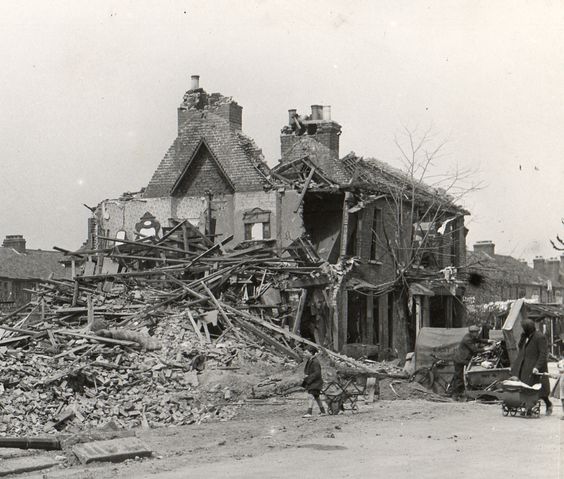 |
| Mountfield Road, East Ham, London. Bomb damage. 19 April 1941. |
German/Bulgarian Relations: Hitler meets with King Boris III of Bulgaria.
German/Hungarian Relations: Hitler meets with the Hungarian ambassador.
Switzerland: Bertolt Brecht's play "Mother Courage and Her Children" has its world premiere at the Schauspielhaus Zürich in Switzerland.
China: The Japanese launch the Fuzhou Operation. This targets an important administrative center that also has a handy airfield. In addition, the Japanese launch the Zhedong Operation, which is in the eastern part of Zhejiang Province.
British Homefront: Today is the compulsory registration date for women aged 20-12. Minister of Labour Ernest Bevin has exempted certain categories of women, such as those with young children, but even they must register to indicate their status. Only the smallest of children will get a mother out of the queues because the government is providing subsidized childcare. The government also is compelling companies to hire women via an Essential Work Order.
American Homefront: Les Pawson wins the Boston Marathon. He becomes the second man to win the race three times.
Weightlifter Steve Stanko lifts 1000 pounds total at the Mid-Atlantic Championships in York, Pennsylvania. This sets a new world record.
 |
| "Snarling Tiger," Emmett Watson, Saturday Evening Post, 19 April 1941. |
April 1941
April 1, 1941: Rommel Takes Brega
April 2, 1941:Rommel Takes Agedabia
April 3, 1941: Convoy SC-26 Destruction
April 4, 1941: Rommel Takes Benghazi
April 5, 1941: Rommel Rolling
April 6, 1941: Operation Marita
April 7, 1941: Rommel Takes Derna
April 8, 1941: Yugoslavia Crumbling
April 9, 1941: Thessaloniki Falls
April 10, 1941: USS Niblack Attacks
April 11, 1941: Good Friday Raid
April 12, 1941: Belgrade and Bardia Fall
April 13, 1941: Soviet-Japanese Pact
April 14, 1941: King Peter Leaves
April 15, 1941: Flying Tigers
April 16, 1941: Battle of Platamon
April 17, 1941: Yugoslavia Gone
April 18, 1941: Me 262 First Flight
April 19, 1941: London Smashed
April 20, 1941: Hitler's Best Birthday
April 21, 1941: Greek Army Surrenders
April 22, 1941: Pancevo Massacre
April 23, 1941: CAM Ships
April 24, 1941: Battle of Thermopylae
April 25, 1941: Operation Demon
April 26, 1941: Operation Hannibal
April 27, 1941: Athens Falls
April 28, 1941: Hitler Firm about Barbarossa
April 29, 1941: Mainland Greece Falls
April 30, 1941: Rommel Attacks
2020

No comments:
Post a Comment